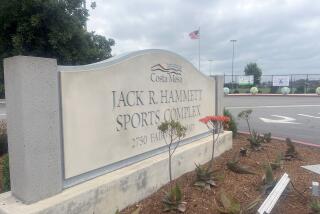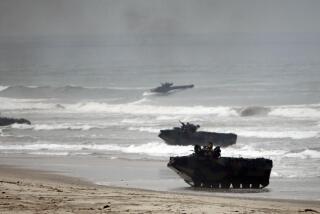Five key Afghan officers visit California
- Share via
Reporting from Camp Pendleton, Calif. — Five high-ranking officers of the Afghan security forces finished a three-day visit to Southern California on Saturday after observing military training and civilian law enforcement operations in the U.S.
One of the things that impressed them most during their instructional visit reminded them of home: a faux Afghan village constructed at Camp Pendleton to help train Marines before they deploy to Helmand province, a longtime Taliban stronghold.
Maj. Gen. Sayed Malouk told reporters that he was pleased to see Marines learning how to distinguish “between innocent people and enemies.”
When the Marines get to Afghanistan, he said, they are confronted by an enemy that hides behind noncombatants and tries to draw the Americans into firefights in which innocents are killed or wounded.
“The enemy are on their knees and cannot fight us face to face ... because we can easily crush them,” he said.
Still, civilian casualties in the decade-long war against the Taliban continue to be a major concern to the Afghan populace, said Malouk, commanding general of the Afghan army forces in Helmand province.
Built at a cost of $28.5 million, the village is modeled after Now Zad, an Afghan farming village. Known in military lingo as the Infantry Immersion Trainer, the site has dozens of buildings, dozens of bazaar stalls, ersatz corn and poppy fields, trash heaps, rutted streets, a mock mosque and numerous vantage points where Taliban snipers could lurk.
Afghan “role players” act as villagers, some friendly, some Taliban sympathizers. The sounds and smells of a village are simulated — including the smell of cooking food, gangrenous wounds and farm animal manure. There are weapons caches hidden in the buildings that the Marines must search.
On cue, snipers “attack” the Marines, to the sound of AK-47s. Buried pyrotechnics explode, with realistic sounds. More than 200 rooftop cameras record the Marines’ reactions so they can be studied and critiqued.
Marines are evaluated, among other things, on whether their responses reduce or increase the risk of civilian casualties.
The village opened last November. A similar training site has been opened at Camp Lejeune, N.C.
Along with their tour of the Infantry Immersion Trainer, the Afghan officers — three from the army, two from the national police — also visited with representatives of the U.S. Border Patrol, the Coast Guard, the Los Angeles Police Department and the Los Angeles County Sheriff’s Department.
From Southern California, the five are scheduled to go to Washington and then to New York, where they will visit the site of the 9/11 attack.
With the Border Patrol officials, the discussion concerned vehicle maintenance, electronic surveillance, the use of biometrics to keep track of those crossing the border illegally and the use of horses in areas where it is difficult for vehicles to travel.
Helmand province borders Pakistan. U.S. officials have complained continually that the Taliban uses Pakistan to smuggle fighters, weapons and bomb-making materials into Afghanistan.
Maj. Gen. Nabi Jan Mullah Khil, regional deputy police commander in Helmand, told reporters that although there has been progress in securing his country’s border with Pakistan, more needs to be done.
The Koran, Khil said, teaches that “if you are hurt by your neighbor, he’s not a true neighbor, not a person who is a true Muslim, and God will punish him.”
More to Read
Sign up for Essential California
The most important California stories and recommendations in your inbox every morning.
You may occasionally receive promotional content from the Los Angeles Times.










